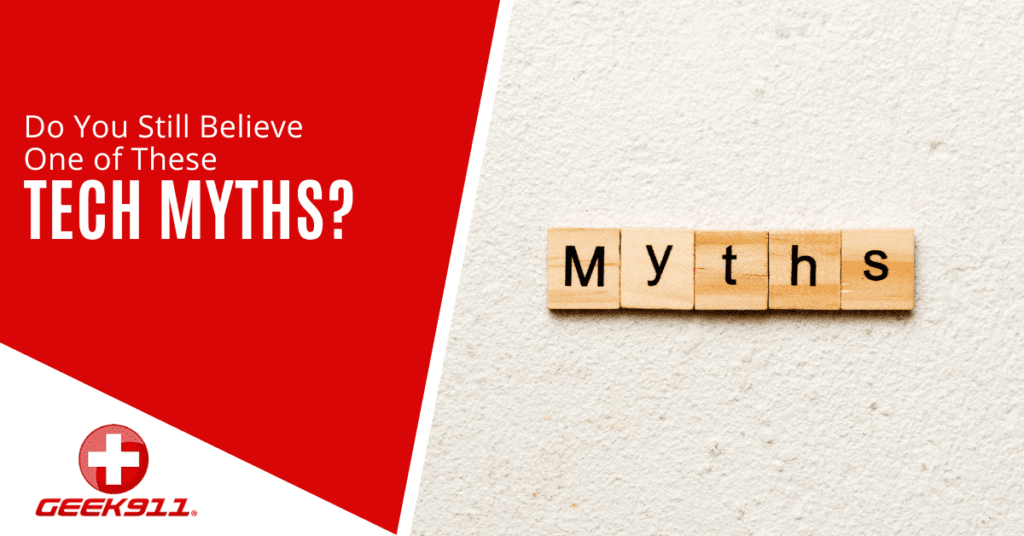Do You Still Believe One of These Tech Myths?

The world we live in now is not the world we were born into. This is because technology has taken over and shows no sign of stopping. In today’s fast-paced digital age, technology has become integral to our lives. We rely on various devices and innovations, from smartphones to smart homes, to simplify our daily tasks and stay connected with the world.
In recent years, technology has transformed the way we interact with others, the way we conduct business, the way we shop, and the way we live and work. According to Forbes, 78% of survey respondents believe technology is a matter of survival. It has become an intrinsic part of our daily routine and is now an essential component of life.
However, along with the rapid advancements in technology, numerous tech myths and misconceptions continue to circulate. These myths often create confusion and hinder us from fully embracing the benefits of technology. These tech myths, whether rooted in outdated information or perpetuated by popular culture, can shape our perceptions and decisions regarding the digital landscape.
In this blog post, we will delve into some of the most popular tech myths people still believe, shedding light on the truth behind them.
Some of the Most Popular Tech Myths People Still Believe
Here are some of the most common tech myths that you might still believe:
More bars on your mobile phone mean better service
Seeing more bars on your phone’s signal indicator does not always indicate greater mobile reception. The signal strength displayed on your smartphone merely displays the connection between your phone and the nearest cell tower. It does not take into account factors like signal quality or network congestion. In some cases, you can experience dropped calls or poor internet access, even with a full signal. If your reception is persistently weak, consider contacting your service provider for assistance.
Private browsing prevents tracking of your data.
Private browsing modes, such as Incognito mode in Chrome or Private Browsing mode in Firefox, are frequently misinterpreted. While they prevent your browser history from being saved on your device, they do not provide total tracking protection. Your internet service provider, websites you visit, and other third parties can still monitor your online activities. To improve your privacy, consider using extra privacy tools, such as browser extensions, that prevent trackers and protect your data.
Using Incognito mode makes you invisible.
Numerous people believe that using incognito mode will keep them anonymous. However, you should be aware that this is a myth. Using incognito mode in your web browser may offer you a false sense of privacy, but it does not make you fully invisible online. While it prevents your browsing history from being saved on your device, your activities can still be traced by your internet service provider (ISP), websites you visit, and other third parties.
To completely secure your privacy, try using a virtual private network (VPN) or Tor browser, which can help hide your IP address and encrypt your internet connection.
Macs are immune to viruses.
Another widely held misconception is that Mac computers are immune to viruses and malware. While Macs have typically been less targeted by malware than Windows PCs, this does not mean they are immune. As Macs become more popular, they become more appealing targets for cybercriminals. It is important to install reliable antivirus software and practice safe browsing habits regardless of the operating system you use.
Closing background apps extends battery life.
It’s a frequent misconception that shutting off background apps on your phone or computer might help you save battery life. However, this is not always the case. Modern operating systems are designed to maximize resource utilization, and shutting apps may actually use more battery power when reopened. Instead, focus on reducing screen brightness, disabling unnecessary notifications, and using power-saving settings to extend battery life.
Charging your phone overnight harms the battery.
A common misconception is that leaving your phone plug-in overnight will damage the battery. However, this belief is mainly out of date. Modern smartphones, computers, and other electronic devices have sophisticated battery management mechanisms. These systems guard against overcharging. Once your gadget reaches its maximum charge capacity, the phone automatically stops charging or switches to trickle charge.
This is true even if it remains connected to the power source. In fact, it is frequently advised to leave your gadget plugged in overnight to ensure a full charge by morning. So, feel free to charge your devices overnight without worrying about battery damage.
More pixels equals a better camera.
This is another widely held belief myth in the tech world, particularly when it comes to cameras. Most people believe that the higher the number of Megapixels on a new smartphone from an OEM, the higher the camera quality. This is frequently not the case, as having more megapixels does not ensure greater image quality produced on that smartphone’s camera.
While megapixels are significant, other parameters such as sensor size, lens quality, and image processing algorithms play a role. A higher megapixel count may result in larger image files, but it does not always imply higher image quality. For a better photography experience, look for cameras with larger sensors and advanced technologies such as optical image stabilization.
Get the Technology Facts From a Reliable Professional
Whether you need help with an infected PC or setting up a corporate network, we’re here for you. We cut through the tech myths to bring you reliable and effective service.
Contact us today to chat about your technology goals and challenges.
